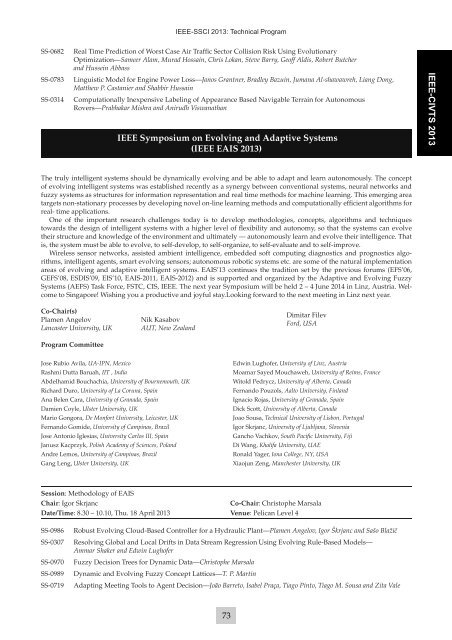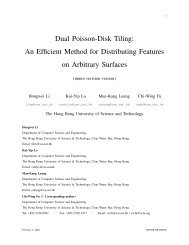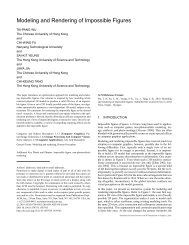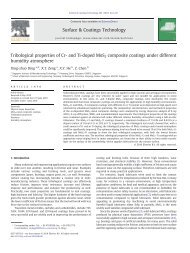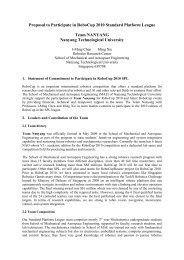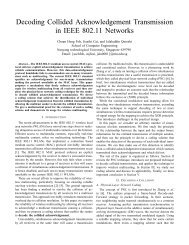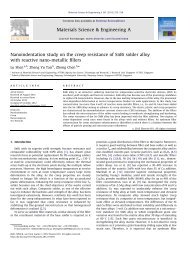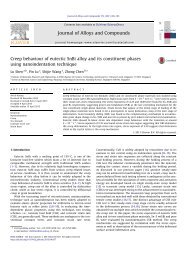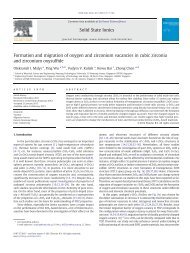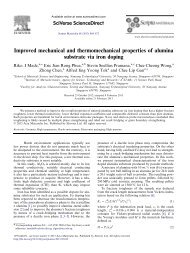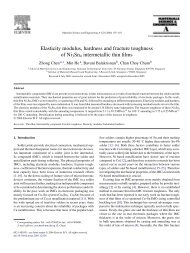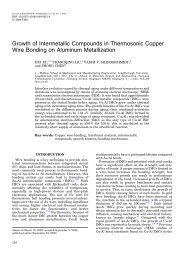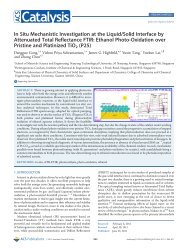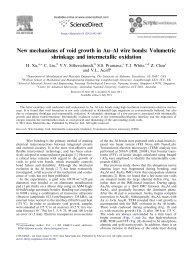Prog-Book_forweb - Nanyang Technological University
Prog-Book_forweb - Nanyang Technological University
Prog-Book_forweb - Nanyang Technological University
Create successful ePaper yourself
Turn your PDF publications into a flip-book with our unique Google optimized e-Paper software.
IEEE-SSCI 2013: Technical <strong>Prog</strong>ram<br />
SS-0682 Real Time Prediction of Worst Case Air Traffic Sector Collision Risk Using Evolutionary<br />
Optimization—Sameer Alam, Murad Hossain, Chris Lokan, Steve Barry, Geoff Aldis, Robert Butcher<br />
and Hussein Abbass<br />
SS-0783 Linguistic Model for Engine Power Loss—Janos Grantner, Bradley Bazuin, Jumana Al-shawawreh, Liang Dong,<br />
Matthew P. Castanier and Shabbir Hussain<br />
SS-0314 Computationally Inexpensive Labeling of Appearance Based Navigable Terrain for Autonomous<br />
Rovers—Prabhakar Mishra and Anirudh Viswanathan<br />
IEEE Symposium on Evolving and Adaptive Systems<br />
(IEEE EAIS 2013)<br />
The truly intelligent systems should be dynamically evolving and be able to adapt and learn autonomously. The concept<br />
of evolving intelligent systems was established recently as a synergy between conventional systems, neural networks and<br />
fuzzy systems as structures for information representation and real time methods for machine learning. This emerging area<br />
targets non-stationary processes by developing novel on-line learning methods and computationally efficient algorithms for<br />
real- time applications.<br />
One of the important research challenges today is to develop methodologies, concepts, algorithms and techniques<br />
towards the design of intelligent systems with a higher level of flexibility and autonomy, so that the systems can evolve<br />
their structure and knowledge of the environment and ultimately — autonomously learn and evolve their intelligence. That<br />
is, the system must be able to evolve, to self-develop, to self-organize, to self-evaluate and to self-improve.<br />
Wireless sensor networks, assisted ambient intelligence, embedded soft computing diagnostics and prognostics algorithms,<br />
intelligent agents, smart evolving sensors; autonomous robotic systems etc. are some of the natural implementation<br />
areas of evolving and adaptive intelligent systems. EAIS’13 continues the tradition set by the previous forums (EFS’06,<br />
GEFS’08, ESDIS’09, EIS’10, EAIS-2011, EAIS-2012) and is supported and organized by the Adaptive and Evolving Fuzzy<br />
Systems (AEFS) Task Force, FSTC, CIS, IEEE. The next year Symposium will be held 2 – 4 June 2014 in Linz, Austria. Welcome<br />
to Singapore! Wishing you a productive and joyful stay.Looking forward to the next meeting in Linz next year.<br />
Co-Chair(s)<br />
Plamen Angelov<br />
Lancaster <strong>University</strong>, UK<br />
<strong>Prog</strong>ram Committee<br />
Jose Rubio Avila, UA-IPN, Mexico<br />
Rashmi Dutta Baruah, IIT , India<br />
Nik Kasabov<br />
AUT, New Zealand<br />
Abdelhamid Bouchachia, <strong>University</strong> of Bournemouth, UK<br />
Richard Duro, <strong>University</strong> of La Coruna, Spain<br />
Ana Belen Cara, <strong>University</strong> of Granada, Spain<br />
Damien Coyle, Ulster <strong>University</strong>, UK<br />
Mario Gongora, De Monfort <strong>University</strong>, Leicester, UK<br />
Fernando Gomide, <strong>University</strong> of Campinas, Brazil<br />
Jose Antonio Iglesias, <strong>University</strong> Carlos III, Spain<br />
Janusz Kacprzyk, Polish Academy of Sciences, Poland<br />
Andre Lemos, <strong>University</strong> of Campinas, Brazil<br />
Gang Leng, Ulster <strong>University</strong>, UK<br />
Dimitar Filev<br />
Ford, USA<br />
Edwin Lughofer, <strong>University</strong> of Linz, Austria<br />
Moamar Sayed Mouchaweh, <strong>University</strong> of Reims, France<br />
Witold Pedrycz, <strong>University</strong> of Alberta, Canada<br />
Fernando Pouzols, Aalto <strong>University</strong>, Finland<br />
Ignacio Rojas, <strong>University</strong> of Granada, Spain<br />
Dick Scott, <strong>University</strong> of Alberta, Canada<br />
Joao Sousa, Technical <strong>University</strong> of Lisbon, Portugal<br />
Igor Skrjanc, <strong>University</strong> of Ljubljana, Slovenia<br />
Gancho Vachkov, South Pacific <strong>University</strong>, Fiji<br />
Di Wang, Khalifa <strong>University</strong>, UAE<br />
Ronald Yager, Iona College, NY, USA<br />
Xiaojun Zeng, Manchester <strong>University</strong>, UK<br />
Session: Methodology of EAIS<br />
Chair: Igor Skrjanc Co-Chair: Christophe Marsala<br />
Date/Time: 8.30 – 10.10, Thu. 18 April 2013 Venue: Pelican Level 4<br />
SS-0986 Robust Evolving Cloud-Based Controller for a Hydraulic Plant—Plamen Angelov, Igor Škrjanc and Sašo Blažič<br />
SS-0307 Resolving Global and Local Drifts in Data Stream Regression Using Evolving Rule-Based Models—<br />
Ammar Shaker and Edwin Lughofer<br />
SS-0970 Fuzzy Decision Trees for Dynamic Data—Christophe Marsala<br />
SS-0989 Dynamic and Evolving Fuzzy Concept Lattices—T. P. Martin<br />
SS-0719 Adapting Meeting Tools to Agent Decision—João Barreto, Isabel Praça, Tiago Pinto, Tiago M. Sousa and Zita Vale<br />
73<br />
IEEE-CIVTS 2013


